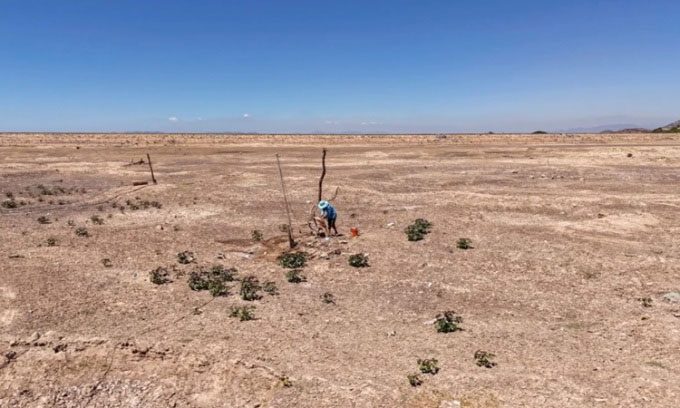Climate experts predict that extreme heat will return and persist in Southeast Asia.
Sweltering heat is affecting the most climate-vulnerable areas, according to CNN.

A resident tries to pump water from a dry well in Ninh Thuận province on April 6. (Photo:
Stringer/AFP)
In Malaysia, at least two heat-related deaths have been reported, including a 22-year-old man from the northern state of Pahang and a 3-year-old boy from the neighboring state of Kelantan. Both died from heatstroke. Authorities in Sabah, a state on the island of Borneo, reported nearly 300 fires breaking out on farms, plantations, and in forests in February. Climate change has made Malaysia susceptible to extreme heat.
In Vietnam, the heat has caused severe drought in the south, pushing temperatures close to 40 degrees Celsius and inflicting heavy damage on agriculture. Last week, Vietnam declared a state of emergency after unusually high temperatures in the south led to parched fields. Rivers have dried up, leaving farmers struggling without water for irrigation.
In the Philippines, hundreds of schools have been forced to close after daily temperatures soared above 42 degrees Celsius.
In Singapore, some schools have asked students to wear cool clothing until further notice, amid prolonged high temperatures in recent weeks. Hundreds of schools in the Philippines, including the capital Manila, have also implemented similar measures, even allowing students to take breaks when temperatures exceed tolerable levels.
Thailand is experiencing severe impacts as temperatures nationwide continuously break records for 13 months, with extreme heat and high humidity.
“We believe that last year’s temperatures were already unbearable, but this year will surpass that. Temperatures in Bangkok will not drop below 30 degrees Celsius, even at night, until the end of April,” said climate expert Maximiliano Herrera, who oversees various weather data pages on Wikipedia. “This trend is unavoidable. The entire region needs to prepare for extreme heat throughout April and into late May.” On April 3, Thailand entered its annual dry season, with Bangkok reaching temperatures of around 42.8 degrees Celsius, forcing many residents to stay indoors and turn on air conditioning.
Alongside these natural fluctuations, the world continues to experience numerous climate records, with extreme heat becoming commonplace. Experts indicate that one of the most concerning aspects of today’s heat waves in the region is their duration.
A group of experts from the Swiss climate research organization IQ Air noted that the current heatwave is “a combination of multiple factors, including human-induced climate change and the El Niño phenomenon.” According to IQ Air, this has resulted in unprecedented high temperatures in the region.


















































